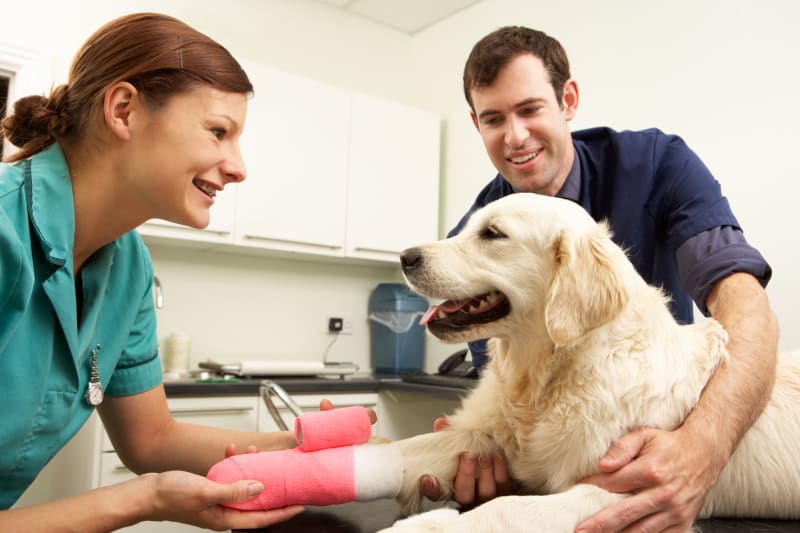Dog owners play a vital role in their pet’s recovery after surgery. To help your canine companion return to their daily routine as quickly as possible, here are some tips from Pawsoha on how to provide attentive post-op care.
The Importance of Following Vet’s Instructions
In the days before and after surgery, both you and your dog may experience some stress. It is crucial to understand how to care for your dog after they come home from the vet to ensure a safe and successful recovery.
Your veterinarian will provide you with clear and detailed instructions on post-operative care for your pup. It is essential to follow these instructions diligently. If you have any doubts or questions, don’t hesitate to reach out to your vet for clarification. Pawsoha is committed to providing your dog with high-quality surgical care and ensuring their well-being during the recovery process.
Effects of Anesthesia
Anesthesia is used during surgery to make it safe and painless for dogs. It is normal for dogs to feel sluggish and experience the effects of anesthesia after the procedure. There is no need to panic if your dog is shaking or seems a little off immediately after surgery. Give them some time to recover.
Helping Your Dog Regain Their Appetite
It is common for dogs to lose their appetite temporarily after surgery due to the after-effects of anesthesia. You can try offering a half-size portion of a light meal such as chicken or rice, which may be easier for them to digest. Within 24 hours, your dog’s appetite should return, and you can gradually reintroduce their regular food. If your dog still refuses to eat after 48 hours, contact your vet for further guidance.
Managing Your Dog’s Pain
Your veterinarian will prescribe pain relievers or medications to manage your dog’s post-surgery discomfort. It is crucial to follow the vet’s instructions regarding dosage and administration to prevent infection and ensure your dog’s comfort. If your dog is prone to anxiety, your vet may also prescribe anti-anxiety medication or sedatives to aid in their healing process. Remember, never give your dog human medications without consulting your veterinarian.
Providing a Comfortable Space for Rest and Recovery
After surgery, your dog needs a quiet and comfortable space to rest and recover. Make sure they have a soft bed with enough room to stretch out. This will help prevent undue pressure on bandaged or sensitive areas of their body. Providing a calm environment away from the hustle and bustle of the household will aid in their recovery.
Addressing Shaking or Coughing After Surgery
It is not uncommon for dogs to experience shaking or coughing after surgery. Shaking is usually a result of anesthesia or pain control medication rather than cold or pain. Give your dog frequent small meals and provide them with extra love and attention to help alleviate any discomfort. However, if coughing persists or worsens, contact your vet for further evaluation.
Restricting Movement for a Smooth Recovery
Depending on the surgery, your vet may recommend limiting your dog’s movement and physical activity for a specific period. This is to prevent any disruptions to the healing process and avoid reopening of incisions. While complete crate rest may not be necessary, you may need to confine your dog to a safe and comfortable room if you are unable to provide direct supervision. Ensure that your dog has access to bathroom breaks outdoors while still restricting their ability to climb stairs or jump on furniture.
Frequently Asked Questions
Q: Is it necessary to restrict my dog’s movement after surgery?
A: Your vet may recommend limiting your dog’s movement to ensure a smooth recovery. Follow their advice, as sudden stretching or jumping can disrupt the healing process. Orthopedic surgery may require more specific confinement measures, such as a smaller pen with increasing exercise as recovery progresses.
Q: How can I help my dog relax after surgery?
A: Providing a quiet and comfortable space for your dog to rest is essential. A soft bed will prevent unnecessary pressure on their body. Give them lots of love and attention to alleviate any anxiety they may be feeling.
Q: What should I do if my dog is shaking or coughing after surgery?
A: Post-surgical shaking and coughing are usually due to anesthesia or pain control medication. Offer your dog frequent small meals and provide them with reassurance. However, if coughing persists or worsens, consult your vet for guidance.
Q: What if my dog won’t eat after surgery?
A: Temporary loss of appetite is common after surgery. Consider offering a light meal such as chicken or rice, and gradually reintroduce their regular food within 24 hours. If your dog still refuses to eat after 48 hours, contact your vet.
Q: How can I manage my dog’s pain after surgery?
A: Your vet will prescribe pain relievers and provide instructions on their administration. Follow their guidance to ensure your dog’s comfort and prevent any complications.
Conclusion
Providing attentive post-operative care is crucial for your dog’s recovery after surgery. By following your vet’s instructions, managing pain, and creating a comfortable environment, you can help your canine companion return to their normal routine. Remember, always consult your vet for any concerns or questions regarding your dog’s recovery.
For more information about Pawsoha and their commitment to your dog’s health and well-being, visit Pawsoha.
